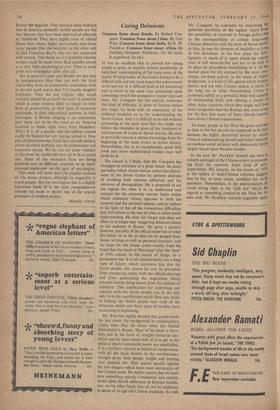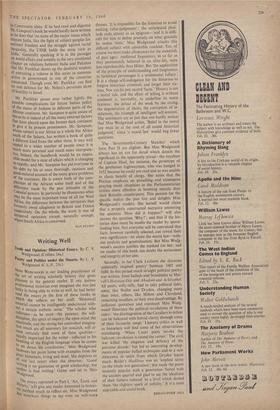Curing Delusions
Common Sense about Russia. By Robert Con- quest. Common Sense about China. By Guy Wint. Common Sense about India. By K. M. Panikkar. Common Sense about Africa. By Anthony Sampson. (Gollancz, 12s. 6d. each; in paperback, 6s. 6d.)
IT was an excellent idea to provide for young people a series of sensibly written handbooks to help their understanding of the main areas of the world. Writing books of this kind is bound to be a difficult task and one must expect the achievement to be uneven. It is difficult both to be interesting and to avoid at the same time presuming upon knowledge which the prospective reader may not have. Mr. Conquest has not entirely overcome this kind of difficulty. A sense of fairness makes him begin his book with an assessment of the evidence available to us for understanding the Soviet Union. And it is difficult to do this without presuming at the same time that the reader can follow the examples he gives of the treatment or mistreatment of events in Soviet sources. He does in particular assume a certain knowledge from the beginning of the main events in Soviet history. Nevertheless, this is an exceptionally good little book and more sophisticated readers may well profit by it.
The reason is, I think, that Mr. Conquest has managed to eliminate to a great extent the senti- mentality which almost always comes into discus- sions of the Soviet Union by persons desirous of avoiding both extreme adulation and the extremes of denunciation. He is prepared to see the regime for what it is, to understand and account for the extremely narrow limits within which consumer choice operates in both the material and the spiritual spheres, and to explore in the light of this all the tremendous difficulties that still subsist in the way of what is called better understanding. He does not forget and does not allow us to forget that 'staggering delusions about us are endemic in Russia.' He gives a picture, however, not only of the official scene but of what lies below, in as far as that can be gauged from Soviet writings as well as personal accounts; and his hope for the future arises mainly from his belief that the check to 'liberalism' after the 'thaw' of 1956 cannot, in the nature of things, be a permanent one. It is not sentimentality but a long view of history which convinces him that the Soviet people, too, cannot for ever be prevented from comparing reality with the official doctrine and from questioning the dogmatism which prevents lessons being drawn from the realities of existence. This justification for improving our
contacts with the Soviet people can, in the end, only lie in the contribution which these may make
to helping the Soviet people cure itself of the delusions which over forty years of tyranny have succeeding in implanting.
Mr. Wint has rightly decided that people know far less about the background to contemporary
China than they do about what lies behind
Khrushchev's Russia. Most of his book is there- fore cast in the form of straight historical nar-
rative and he takes about half of it to get to the point at which Communist power was established. It is a brilliant exercise in historical compression, with all the main factors in the revolutionary changes given their proper weight and nothing vital omitted. Mr. Wint guards equally against the two dangers which beset most interpreters of the Chinese scene. He neither asserts that we have here something entirely Communist and entirely based upon slavish adherence to Russian models, nor, on the other hand, that all can be explained in terms of an age-old Chinese tradition. As with
M r. Conquest, he concludes by examining the potential durability of the regime. Apart from the possibility of reversals in foreign policy due to the incompatibility of certain long-range Chinese objectives with the facts of Soviet power in Asia, he sees the elements of instability as lying in two directions. In the first place the intel- ligentsia or much of it, upon which the regime rests, is still unreconciled and has to be kept to its place by procedures humiliating to it. In the second place the life imposed by the rural com- munes, ant-heap activity in the name of higher production, is a kind of life against which human nature, and not only Chinese nature, is likely to the long run to rebel. Nevertheless, China Is presented rightly as a powerful State well capable of maintaining itself, and offering a model to other Asian countries which they might well find more acceptable than the Russian one, were it not for the fact that many of them cherish natural fears about Chinese expansionism.
To many people in the West the great contrast in Asia in the last decade has appeared to be that between the highly dictatorial system by which China is industrialising herself and India's attempt to combine social advance with democratic forms largely based upon Western models.
In the past Mr. Panikkar himself has been a notable apologist of the Chinese system as emanat- ing from the common Asian fund of anti- imperialism. His remarks on the events of 1959 in the sphere of Indo-Chinese relations suggest that he has, to some extent, modified this early optimism. Nevertheless, in his• determination to avoid taking sides in the 'cold war' which he regards as something created by the West for its own ends, Mr. Panikkar remains singularly open to Communist ideas. If he had read and digested Mr. Conquest's book he would hardly have written as he does that 'on some of the major issues which interest India, like the fight of subject peoples for national freedom and the struggle against racial inequality, the USSR holds the same view as India.' Generally speaking it is in the passages on world affairs and notably in the very emotional chapter on relations between India and Pakistan that Mr. Panikkar shows up the doubtful wisdom of entrusting a volume in this series to someone active in government in one of the countries concerned. Though even Mr. Panikkar can find no real defence for Mr. Nehru's persistent show of hostility to Israel.
Mr. Panikkar passes over rather lightly the Possible complications for future Indian policy of the status of Indians in different parts of the African continent. Mr. Sampson is quite aware of this as he is indeed of all the many external factors that have played upon the former dark continent to give it its present prominence. Mr. Sampson, Whose subject is not Africa as a whole but Africa south of the Sahara, has written a book of quite a different kind from the other three. It may well appeal to a wider number of people since it is much more personal and much more interpreta- tive. Indeed, the handbook would be an impos- sible model for a state of affairs which is changing so rapidly; and Mr. Sampson has put everyone in his debt by his at once thorough, cautious and OW-natured account of the many grave problems of the continent. He is aware both of the coma Plexities of the African scene itself and of the difference made by the past attitudes of the Colonial powers. In particular he illuminates what may be the most important issue of all for West Africa, the difference between the territories that formerly owed allegiance to Britain and France respectively. On the whole, 'the work is one of tempered optimism except, naturally enough, Where South Africa is concerned.
MAX BELOIT







































 Previous page
Previous page